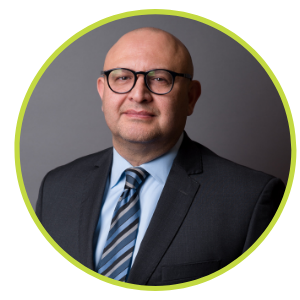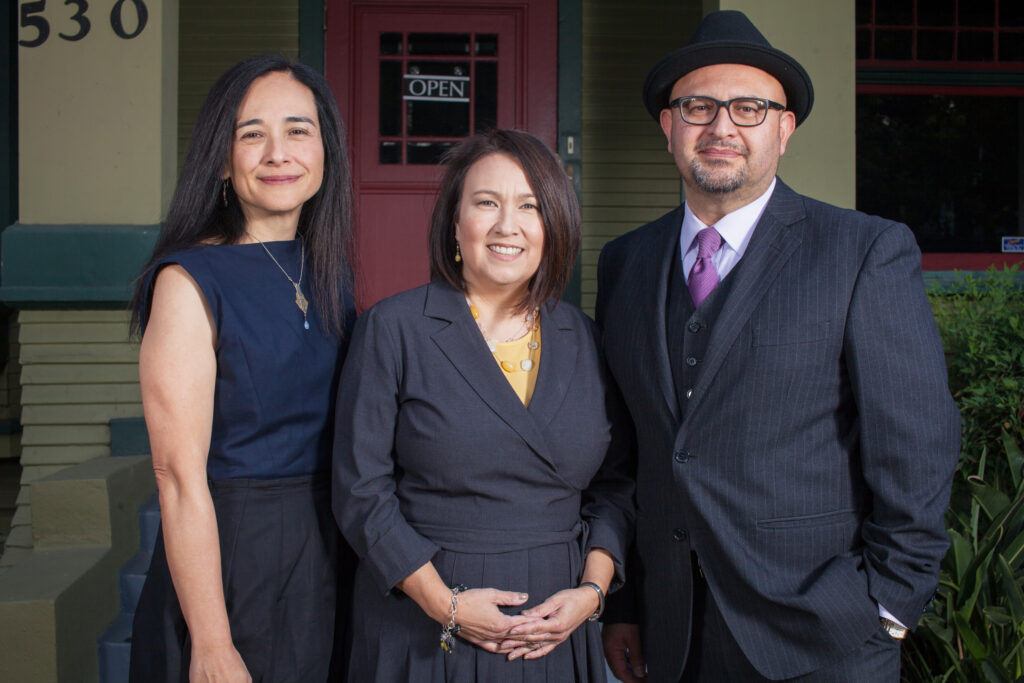
By Manuel Bernal and Joaquin Bernal
Dear ELACC staff, the board of directors and community,
As the newly-appointed president of ELACC as well as the co-chair of the board of directors, I’d like to give an update on the current status of ELACC and give readers an introduction to who I am. My involvement with ELACC stretches back to its founding. I was one of the four founding board members of the organization which, aside from myself, included Maria Cabildo, Evangeline Ordaz, and Leonardo Vilchez.
I became ELACC’s first executive director in January of 1996, a position that I held until September 1999 when I left the organization and was succeeded by Maria Cabildo. In a way, it has been more than 20 years since my involvement in an official capacity with the organization. Despite leaving, I had still cared for the organization and continued to watch over it, even though I had no formal say in its operations after my departure.

Back in December of 2019, I heard that the organization had to lay off a large number of employees. In my experience, when an organization does that, it is a cause for alarm. Usually, there’s something severe driving that decision, especially if it happens so quickly without anticipation or forethought. I became concerned and contacted the president of the board, Araceli Sandoval Gonzalez. Over a cup of coffee earlier this January, she confirmed my concerns about how ELACC had laid off people and that it indeed had a fair bit of unresolved financial issues. Taking into account my familiarity with non-profit management over the past 30 years, I thought that I had something valuable to contribute and subsequently offered to help the organization. At the time, I thought that in order to aid ELACC, it was necessary that I hold in a formal position so it wouldn’t seem as if I were meddling or interfering in the organization’s business. Araceli agreed and in a week’s time, I received a call from her confirming that I had been voted onto the board of ELACC.
In 1999, the state of the organization at the time was a healthy one. From its founding, ELACC had gone from nothing to a worthy non-profit; at that point in time we had programs in place, we were working on development projects, and even had the beginnings of community organizing in place. ELACC had grown– and stabilized quite a bit. But it needed someone who could take it to the next level and progress ELACC’s mission even further. In the meantime, I went on to do for another organization what I did for ELACC: to help grow it. The organization that I joined to improve was the then-called the National Farmworkers Service Center, an offshoot nonprofit of the United Farmworkers. With that organization, we provided services throughout the Southwest; one of those services being affordable housing.
In time, I became the Vice President for Housing and Economic Development for the expanding organization up until my exit in 2011. In those eleven or twelve years, we grew the National Farmworkers Service Center from a California-based organization with 1200 affordable housing units to an organization that spanned four states: California, New Mexico, Arizona, and Texas; and had developed approximately 4000 units.
By the beginning of 2011, I had grown tired of all of the traveling that was required of me by the organization, then-renamed into the Cesar Chavez Foundation. In addition to this, I wished to focus more time on my family and take care of my ailing father in particular. It was that year when I quit working for the Cesar Chavez Foundation and began to work for the city of Los Angeles as the Director of Housing which helped with funding affordable housing projects throughout the city. At the same time, I was given the opportunity to be on the board of the Cesar Chavez Foundation. And in 2017, The Cesar Chavez Foundation (which had grown tremendously) created a new position, Chief Operating Officer, which entailed overseeing the organization’s operations. The president was in need of extra help and the position was offered to me in March of that year in which I re-joined the foundation. Since that time, I have stood as the Chief Operating Officer of the foundation. As it stands today, the foundation is an immensely diverse organization that is not limited to just housing but also deals with economic development, educational services, and communications (the foundation owns eleven radio stations across the southwest).
Naturally, along the way, I have learned a lot about organizational management, strategic planning, operational planning, budgeting, staff management, and all the other skills that people typically need to be able to run a non-profit organization. Going back to the layoffs in December, I reflected on my experience in non-profits and thought I could lend my support to the board. When Araceli and the rest of the board members agreed, I was instated onto the board in mid-January.
ELACC has been around for a long time (since 1995) and it has come a long way as well. Reflecting on its accomplishments, I feel proud. I feel proud of what all the staff and board members have been able to achieve over the course of the past 25 years. Obviously, the organization is very different from when I was last a formal part of it; in a good way. Staff commitment has been instrumental, as ELACC has worked hard to develop affordable housing, wealth-building, and organizing. All of which wouldn’t have happened if ELACC hadn’t been there and if its staff did not have the drive that they do. However, looking back on the past four months and the layoffs in both December and May, I view ELACC’s current troubles as a consequence of growing too quickly and not building the management systems that are needed to properly manage an organization so complex and so diverse. There are systems and structural improvements that must take place in order for the organization’s mission to continue.
I have thought a lot about where I’d like ELACC to go from here. After the sudden resignation of the past president of ELACC, the board rushed to find a replacement for her post. We spent two days identifying the best options possible to move forward and at the end of the weekend, the most viable option the board had in front of them was to appoint me as president. After a day and a half of seeking other options, I volunteered to head the organization. I figured that knowing the organization somewhat, including being part of the founding board members and having my name known to a lot of ELACC’s partners, it would create some stability. And so, the board decided to appoint me as president of the organization March 8. The following day, we announced our decision to staff, to which there was much shock. In the end, we believed it was the best thing to do to move the organization forward.
All of a sudden, COVID hit, and layers of complexity were added to what was already a complex situation. The fundraising world as we knew it was turned on its head and the financial gap that we had for the year became much more severe and hard to fill. At that point in time, our first priority was to stabilize the finances of the organization and to take a serious look at what resources or revenue we had coming in for the year and align them with the expenses that we could afford throughout the year. The decision was then made to have a second wave of layoffs so that we can balance the budget under a very conservative view of the future with COVID-19 in front of us. Laying off and dismissing another eleven or so employees was one of the hardest things that I’ve ever done in my professional life. Still, I wouldn’t have done it if it didn’t provide an opportunity for ELACC to continue and have the opportunity to re-establish and stabilize itself. As of right now, the organization faces two important problems to tackle. The first being the lingering political battles within the community, where there’s a conflict between ELACC and some community members and staff that must be resolved so that there may be peace. The second is that we must take a look at the long-term vision of the organization and either reaffirm it or reset it so that there may be a clearer direction by the board so that we may know where ELACC will be going over the next 10 years.
One of the questions I’ve been asked is how long I’m going to stay. In truth, I’m committed (for intangible reasons) to this organization and I plan to stick with this present role in order to stabilize the organization, as I have said. The reality is that ELACC needs and deserves a full-time president and the search for someone capable of leading the organization into its next chapter has already started. The board, at this moment, is in the process of trying to find the best time to introduce this next leader who will co-run the organization with me for a considerable amount of time so that they may be acclimated to the many nuances of this very special organization.
Today’s ELACC is not the same as the ELACC at the height of its staffing just 6 months ago. ELACC being such a large organization meant it had 44 staff at one point, tons of programs, and a lot of impact. We did a lot of good and these are obviously things to be proud of. Unfortunately, it was not sustainable as ELACC had stretched itself thin. The challenge now is rebuilding ELACC back to that level in a sustainable manner. It’s my belief that not only is it possible, but certain that ELACC will rebound and re-emerge from this temporary reduction once we get our systems in place and re-envision what ELACC can do. Today, I feel confident that this can be accomplished and I look forward to working with staff, board, and community members out there to make sure that it happens.
Our 25th anniversary is an important milestone. The reality is that not many organizations are able to survive five years, and the fact that an organization like ours that has survived for twenty-five years is something to be proud of and celebrated. It’s certainly well-deserved, as the work accomplished over the past twenty-five years is tremendous and has changed the community in so many ways. Admittedly, it’s hard at the moment to celebrate such an accomplishment during the era of social-distancing but I’d like to give my thanks to the many ELACC staff, both past and present, who have made such a huge imprint and have, overall, made the community a much better place.
Kind regards,
Manuel Bernal
